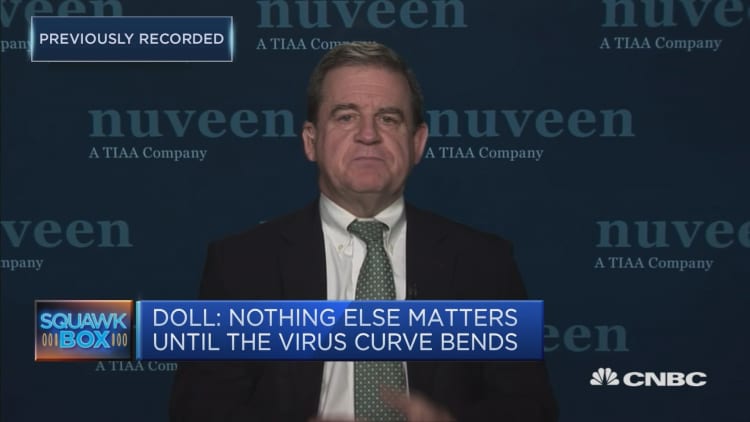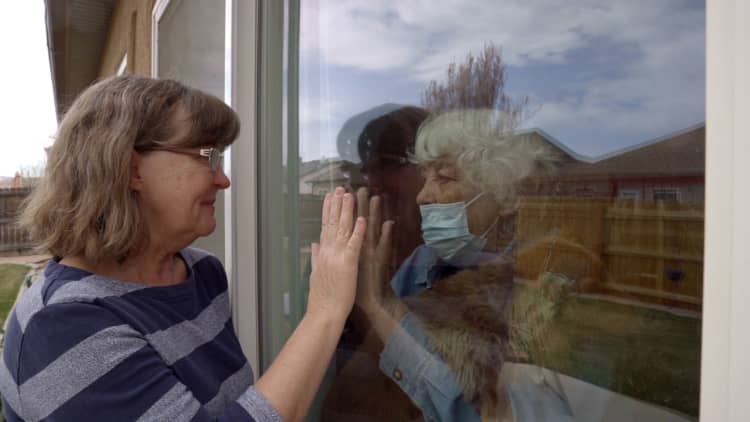In the months since Covid-19 has emerged as a global health crisis, countries around the world have shuttered businesses and told citizens to stay home in an attempt to mitigate the effects of this deadly virus.
In the U.S., 45 states have full or partial stay-at-home orders in place that restrict all but the most essential employees from heading to their workplace. And while there are signs that those orders are helping reduce the number of Covid-19 cases, it has led to the most rapid shutdown of economic activity that the U.S., or even the global economy, has ever seen.
Roughly 22 million Americans have applied for unemployment over the past three weeks and experts are predicting that the U.S. will see double digit drops for gross domestic product (GDP) from April to June.
"The United States economy is in a medically induced coma. We've never done this before," Jason Furman, an economist and professor at Harvard Kennedy School, tells CNBC Make It. "So the question is: Can we revive the patient when we want to and need to?"
It's a "very unusual circumstance that we find ourselves in," says Cecilia Rouse, an economist and the dean of the Woodrow Wilson School of Public and International Affairs at Princeton University. "Covid-19 has already exacted an immense impact on the economy."
The dramatic slowdown has led many experts, including economists, to predict the U.S. will enter a recession this year. Some are even fearful that we could enter a depression. But is this just hyperbole? Or is the U.S. economy truly in deep trouble?
What's a financial recession?
A recession is generally defined as a period of significant decline in GDP in back-to-back financial quarters. Experts, however, defer to the private non-profit research organization National Bureau of Economic Research to officially determine when a recession begins and ends.
The NBER team considers more than just the GDP when declaring a recession. They also look for "a significant decline in economic activity spread across the economy, lasting more than a few months, normally visible in real GDP, real income, employment, industrial production and wholesale-retail sales."
The negative impact of coronavirus on the U.S. economy has been swift and dramatic, and we're already seeing some of the typical signs of a recession. Along with rising unemployment rates, retail sales plummeted 8.7% last month, while total industrial production fell 5.4% — the largest drop since January 1946. The drop in retail sales was the biggest monthly decline ever recorded, blowing past the 4.3% slump that the U.S. experienced in November 2008 during the Great Recession, according to the National Retail Federation.
So where does that leave us? Likely in a recession, even if we can't officially call it one yet. "It's almost impossible to imagine that we're not already in a recession," Furman says. "We won't be able to call it until we see all the data later on but almost certainly the recession started in the month of March."
The economy, simply put, just isn't behaving normally, so that's why economists and financial experts tend to use the word recession now, says Joseph Stiglitz, a Nobel Prize-winning economist and professor at Columbia University. "Whether you call it a technical recession in the sense of two quarters, we are in a deep, deep downturn."
Stiglitz predicts the U.S. will have six months of negative growth. "That's a little bit of what you might say, a risky forecast, an uncertain forecast, because we don't know how long the pandemic will be with us."
Yet it's the uncertainty that's leading many to worry about the full economic impact of the coronavirus pandemic. Some experts even fear that the U.S. is heading into a full-blown depression.
So then what is a financial depression?
There's no officially accepted definition of a depression, says Stiglitz, author of "People, Power, and Profits: Progressive Capitalism for an Age of Discontent." A depression just means a long recession, Rouse says.
The difference between a recession and depression comes down to the length of time that the economic downturn lasts and also the depth, or severity, of the effects. The Great Recession, for example, lasted from December 2007 until June 2009 and unemployment peaked at 10%.
Yet during the Great Depression, which lasted about 10 years, from 1929 to 1939, unemployment reached 25%.
Transitioning from a recession to a depression is not just about how high the unemployment rate goes. "It just needs to stay high for some time," Furman says. Currently, the U.S. unemployment rate is about 10%, but it's expected to continue to grow. Economists with the St. Louis Federal Reserve estimate that the total number of Americans without a job could hit 47 million, or about a 32% unemployment rate.
"I would say if in December 2021 the unemployment rate is above 15%, then we're in something like a depression," Furman says. And yet he's not convinced the U.S. is heading that way.
While two months of high unemployment is terrible, the U.S. government can protect families against that, he says. "A decade of high unemployment would represent a really epic failure of economic policy of a type that I think is very unlikely to happen now," Furman adds.
Why is there confusion over where the economy is heading?
The weather forecast seems more predictable than the economy these days. That uncertainty remains, in part, because this current economic downturn isn't like anything the U.S. has experienced in the past.
"Typically, our recessions have been induced because of an issue in the financial market, oil prices, monetary policy — it's usually induced from some sector in the economy," Rouse says. "This is from a public health scare and a public health crisis, and so I think we just honestly don't know."
Furman agrees, saying that over the course of the last century, the U.S. hasn't seen anything like what it's experiencing now. "Economists are not at all confident," he says.
There are two economic models that most experts are using to predict what effect coronavirus will have on the economy. One is based on what typically happens after a natural disaster. When a hurricane hits an area, for example, usually most people return to work and the economy snaps right back to normal, Furman says
But economists are also looking at the economic model for what typically happens after a financial crisis. After the U.S. experiences a financial crisis and a recession, it generally takes five to 10 years for the economy to return to normal," Furman says.
Rather than a quick recovery that an economist might expect after a natural disaster, Furman believes that the financial crisis scenario is a far more likely economic outcome of the coronavirus pandemic. But either scenario is possible, Furman says. Or the current health crisis could trigger an entirely new economic response.
What can we do to mitigate the effects of the coronavirus on the economy?
The longer the current coronavirus pandemic goes on, the more damage it will do to the U.S. economy, Rouse says. "This is a situation where the more we're able to respect the need for physical distancing, the need to take care of ourselves and bend this curve, the more we step back from our economic activity, the faster we'll actually recover and emerge from this," she says.
Yet there's hope that the impact will not be as long-lasting as some of the downturns we've faced in the past. The Great Depression happened in part because of a dramatic failure of government, Furman says. "The policymakers then were not taking the types of steps that policymakers are taking now."
Last month, federal lawmakers passed a $2.2 trillion aid package to help Americans impacted by the coronavirus. The legislation boosted unemployment insurance payouts, sent stimulus checks to millions of Americans and set up relief for small businesses. Actions like these are likely to keep the U.S. from repeating the Great Depression, Furman says.
In many ways, there are still even more steps the government can take. In fact, the U.S. lags behind many European countries, which have set up social safety systems and initiatives, such as nationalizing payrolls, offering robust national paid sick leave and supporting national health-care systems, Rouse says. "It will be very interesting to see how the U.S. economy fares in coming back once we get past that public health crisis compared to some of the European countries."
Within the U.S., Stiglitz says there are several initiatives federal lawmakers and regulators could take to help soften the economic blow. The biggest: support states. "We aren't helping the states enough. We're not even helping the states to meet the extra cost of the virus," he says, adding that many states are likely facing budget shortfalls so they will have to cut expenses, including for unemployment processing, education, health and welfare programs.
The U.S. also needs to do more to protect Americans from high interest rates and fees, Stiglitz says. While the Federal Reserve lowered interest rates to zero, APRs on credit cards, mortgages and loans have not dropped that low. "Your interest on your credit card is piling up. The banks aren't on hold," he says. It's not enough to just send Americans relief checks, regulators need to make sure that Americans aren't being dinged when they can least afford it. "Banks have to be put on hold to like the rest of the economy."
Policymakers need to continue to do really big things, Furman says. "Don't be complacent and assume everything's gonna be fine," he says. Americans need to continue to put pressure on lawmakers and government leaders to make sure big things keep happening. "If they do, I think we can prevent the very worst from happening here," Furman says.
Check out: The best credit cards of 2020 could earn you over $1,000 in 5 years
Don't miss: If you lose your job due to the coronavirus pandemic, here's how to navigate filing for unemployment




